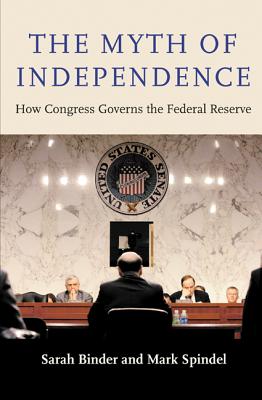

 Princeton University Press
Princeton University Press
The Myth of Independence: How Congress Governs the Federal Reserve


Key Metrics
- Sarah Binder
- Princeton University Press
- Hardcover
- 9780691163192
- 9.3 X 6.4 X 1.2 inches
- 1.35 pounds
- Business & Economics > Money & Monetary Policy
- English
 Secure Transaction
Secure TransactionBook Description
Born out of crisis a century ago, the Federal Reserve has become the most powerful macroeconomic policymaker and financial regulator in the world. The Myth of Independence traces the Fed's transformation from a weak, secretive, and decentralized institution in 1913 to a remarkably transparent central bank a century later. Offering a unique account of Congress's role in steering this evolution, Sarah Binder and Mark Spindel explore the Fed's past, present, and future and challenge the myth of its independence.
Binder and Spindel argue that recurring cycles of crisis, blame, and reform propelled lawmakers to create and revamp the powers and governance of the Fed at critical junctures, including the Panic of 1907, the Great Depression, the postwar Treasury-Fed Accord, the inflationary episode of the 1970s, and the recent financial crisis. Marshaling archival sources, interviews, and statistical analyses, the authors pinpoint political and economic dynamics that shaped interactions between the legislature and the Fed, and that have generated a far stronger central bank than anticipated at its founding. The Fed today retains its unique federal style, diluting the ability of lawmakers and the president to completely centralize control of monetary policy.
In the long wake of the financial crisis, with economic prospects decidedly subpar, partisan rivals in Congress seem poised to continue battling over the Fed's statutory mandates and the powers given to achieve them. Examining the interdependent relationship between America's Congress and its central bank, The Myth of Independence presents critical insights about the future of monetary and fiscal policies that drive the nation's economy.
Author Bio
Sarah Binder is senior fellow in Governance Studies at the Brookings Institution and professor of political science at George Washington University, where she specializes in Congress and legislative politics. Binder’s current research explores the historical and contemporary relationship between Congress and the Federal Reserve, and she is the co-author with Mark Spindel of The Myth of Independence: How Congress Governs the Federal Reserve (Princeton University Press, 2017). She is also an associate editor of The Washington Post’s Monkey Cage blog.
Binder is a former co-editor of Legislative Studies Quarterly, a co-author with Forrest Maltzman of Advice and Dissent: The Struggle to Shape the Federal Judiciary (Brookings, 2009), author of Stalemate: Causes and Consequences of Legislative Gridlock (Brookings, 2003), Minority Rights, Majority Rule: Partisanship and the Development of Congress (Cambridge University Press, 1997), and co-author with Steven S. Smith of Politics or Principle? Filibustering in the United States Senate (Brookings, 1997). Her other work on Congressional politics has appeared in the American Political Science Review, American Journal of Political Science, and elsewhere.
Her book on legislative gridlock was awarded the 2003 Richard F. Fenno, Jr. Prize by the American Political Science Association for the best book published on legislative politics, and she was elected to the American Academy of Arts and Sciences in 2015.
Binder received her Ph.D. in political science from the University of Minnesota in 1995 and B.A. from Yale University in 1986. She joined Brookings in 1995 and George Washington University in 1999. Between 1986 and 1990, she served as legislative aide and press secretary to Rep. Lee Hamilton (D-Indiana).
Source: Brookings Institution
Videos
No Videos
Community reviews
Write a ReviewNo Community reviews